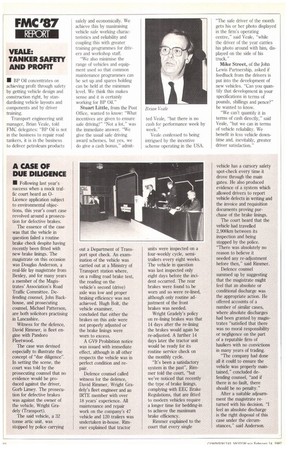VEALE: TANKER SAFETY AND PROFIT
Page 34

If you've noticed an error in this article please click here to report it so we can fix it.
• BP Oil concentrates on achieving profit through safety by getting vehicle design and construction right, by standardising vehicle layouts and components and by driver training.
Transport engineering unit manager, Brian Veale, told FMC delegates: "BP Oil is not in the business to repair road tankers, it is in the business to deliver petroleum products safely and economically. We achieve this by maximising vehicle safe working characteristics and reliability and coupling this with greater training programmes for drivers and workshop staff.
"We also minimise the range of vehicles and equipment used so that common maintenance programmes can be set up and spares holding can be held at the minimum level, We think this makes sense and it is certainly working for BP Oil."
Stuart Little, from the Post Office, wanted to know: "What incentives are given to ensure safe driving?" "Not a lot," was the immediate answer. "We give the usual safe driving award schemes, but yes, we do give a cash bonus," admit
ted Veale, "but there is no cash for performance week by week."
Veale confessed to being intrigued by the incentive scheme operating in the USA. "The safe driver of the month gets his or her photo displayed in the firm's operating centre," said Veale, "while the driver of the year carries his photo around with him, displayed on the side of his truck."
Mike Street, of the John Lewis Partnership, asked if feedback from the drivers is put into the development of new vehicles. "Can you quantify that development in your specifications in terms of pounds, shillings and pence?" he wanted to know.
"We can't quantify it in terms of cash directly," said Veale, "but we can in terms of vehicle reliability. We benefit in less vehicle downtime and, inevitably, greater driver satisfaction."




















































































